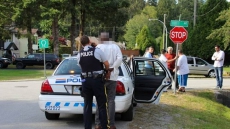VANCOUVER — A harm reduction group on the front line of Vancouver's overdose crisis can now include a small, furry mouse on the list of lives it has saved.
Melissa Patton was volunteering with the Overdose Prevention Society in the city's Downtown Eastside on Sunday when a woman showed up with a pet mouse, saying the animal had eaten heroin.
The animal was "pretty comatose," barely moving and barely breathing, she said.
"You can't really Narcan her because she's so tiny, like with an injection," Patton said, referring to the brand name for the overdose-reversing drug naloxone.
"So I just put a little Narcan on my finger and I put it on her nose and she wiped it off with her paws and was licking it."
Patton, a pharmacy student, happened to be recovering from pneumonia so was carrying a small oxygen tank with her at the time.
"I put that on a super, super low dose and I put that against her nose as well," she said. "That seemed to help a little bit."
Skin-on-skin contact is important, Patton added, so she kept the animal against her neck and provided water and protein powder through a syringe.
By the following morning the animal had made a full recovery, with replenished energy and a renewed appetite.
"Right now she really seems to like Cheerios, bananas and strawberries," Patton said, laughing.
Patton named the animal Snuggles after the owner said she was going in for detox treatment the following day and needed someone to look after her animal.
The society's co-founder, Sarah Blyth, said the incident highlights how the organization's volunteers go above and beyond to look after the approximately 600 clients they see every day.
"They're dealing with emergency situations all the time and they're just angels, really," she said.
Blyth said it isn't common that pets overdose but she has heard reports of some receiving naloxone after their owners have left out drugs. It is especially dangerous when children are involved, she added.
"People need to know to be careful with their drugs around children and pets," Blyth said. "Drugs and kids and pets are really just not good."
Blyth added that it was unfortunate that it takes a mouse overdosing for the opioid crisis to make headlines, but anything that brings attention to the situation is a good thing.
In the first three months of this year, 347 people died of drug overdoses in the province, a figure significantly higher than the same period last year when health officials declared a state of emergency.
Patton said helping pets is part of how overdose-prevention sites care for people.
"What is important to the client is important to us," she said. "If we can take away the barriers that are going to prevent somebody from getting the help then we're going to do that."




